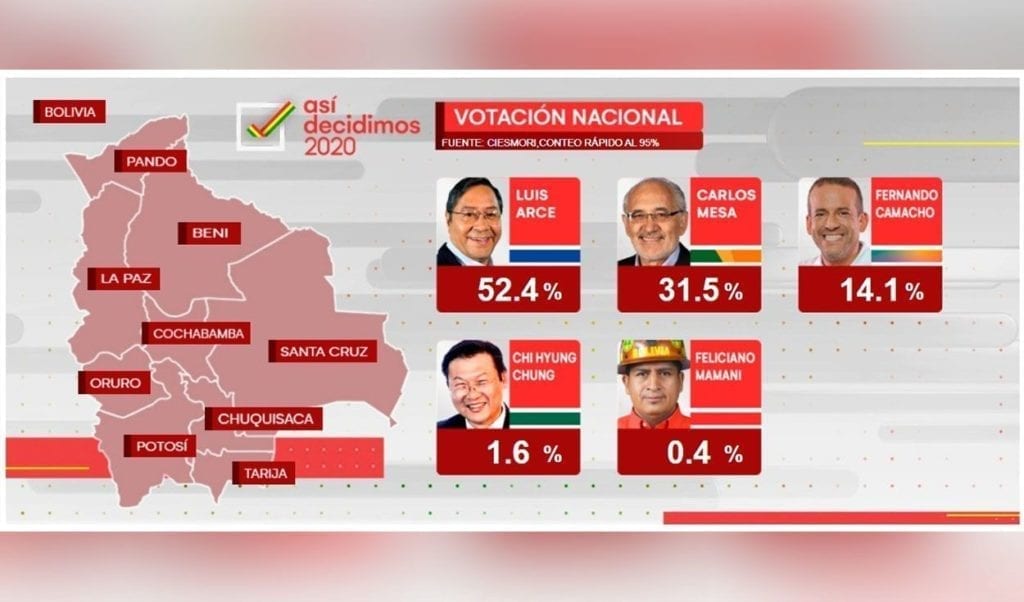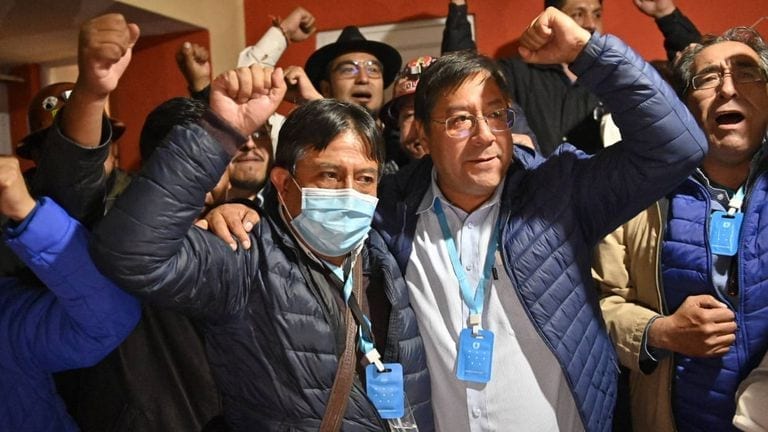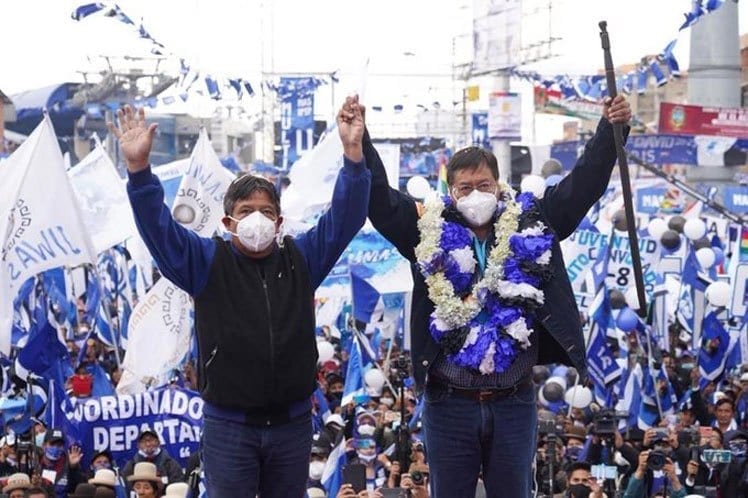On October 18, Bolivia held the General Election, which was the most anticipated event in Latin America this month. For a whole year, a transitional government headed by Jeanine Áñez was in power in this Latin American country. Will the long-awaited peace return to Bolivia? And who won the electoral process?
Jeanine Áñez (Spanish – Jeanine Áñez Chávez) took office as head of state of Bolivia through constitutional succession on November 12, 2019 after the resignation of Evo Morales (Spanish – Juan Evo Morales Ayma). Almost a year has passed since that moment. The transitional government stayed in power for a very long time, although its main functions were: stabilization of peace in the country after the riots and social convulsions that split Bolivia in October-November last year; and the designation and implementation of a new transparent and fair electoral process. However, from the very beginning, Áñez postponed the date of the General Election, and then the pandemic and the related sanitary crisis in the country made adjustments to the electoral calendar.
More than a dozen corruption cases, high-profile resignations of civil servants, the “fluidity” of the Áñez Cabinet, the sanitary crisis caused by the global outbreak of the COVID-19 virus, and the adoption of new controversial laws, causing sharp criticism of regional and international leaders are just some of the topics with which Bolivia approached the holding of the General Election. The electoral calendar was shifted four times, and as a result, the electoral process was scheduled for October 18. According to the Political Constitution of Bolivia, on this day, the citizens of the country elected a president, vice president, 130 deputies in the lower and 36 deputies in the upper house of the Plurinational Legislative Assembly.

The main favorites of the 2020 election campaign: Carlos Mesa, Luis Arce and Fernando Camacho.
After the Acting President Jeanine Áñez withdrew her candidacy on September 17 and called for the unity of voters opposing the “Movement to Socialism” (Spanish – Movimiento al Socialismo, MAS), in order to form a bloc against Luis Arce (Spanish – Luis Alberto Arce Catacora) and prevent the return to power of the party of supporters of Morales, a few days before the date of the General Election, Jorge Tuto Quiroga (Spanish – Jorge Quiroga Ramírez) from the political platform “Freedom – 21” (Spanish – Libre 21 ) and Maria de la Cruz Bayá (Spanish – María de la Cruz Bayá Claros) from the “Nationalist Democratic Action Part”y (Spanish – Acción Democrática Nacionalista, ADN) also refused to participate.
Based on the Political Constitution of Bolivia, in order to win the first round of voting, a candidate must either enlist the support of more than 50% of voters, or 40%, provided that the gap from his closest rival is at least 10%. If none of the conditions are met, then a second round is held, which this time was determined for November 29th. Analyzing the results of a number of public opinion polls, at the time of the electoral process, experts agreed that it was impossible to single out a pretender capable of winning the first round of voting. Nevertheless, these polls of various national and regional consulting agencies were carried out via the Internet and mainly among the population of large cities, excluding those living in rural areas, where the party of the former President of Bolivia, Evo Morales, traditionally held a strong position.

Results of the exit poll of the consulting agency “Ciesmori”.
Source: newspaper “La República”.
After the vote on October 18, the preliminary results became known early the next morning. According to the exit poll of the consulting agency “Ciesmori”, Luis Arce got 52.4% of the votes, which is enough to win the first round, and 31.5% of voters gave the vote for his closest rival Carlos Mesa (Spanish – Carlos Diego Mesa Gisbert) from the “Civil Community” party (Spanish – Comunidad Ciudadana). The third place was taken by the regional leader of the Santa Cruz department Fernando Camacho (Spanish – Luis Fernando Camacho Vaca) from the political bloc “Believe” (Spanish – Creemos) with 14.1% of the vote.
However, according to the official data of the Supreme Electoral Court (Spanish – Tribunal Supremo Electoral) on October 21, when 86.63% of the ballots were counted, the candidate from the “Movement to Socialism” wins with 54.1% of the votes. It is worth noting that this result is 7% more than in the General Election in 2019, when Evo Morales was nominated from this party, and the same level of support as in the 2005 electoral process. Luis Arce’s gap of 25% from the closest rival already gives the right to assert that the new head of state was determined by the voters in the first round.
The President of the Supreme Electoral Court (TSE) Salvador Romero (Spanish – Salvador Romero Ballivián) stressed that the Election Day ended with a peace process with a high degree of participation of Bolivian citizens, which, he said, was necessary for the country “to strengthen its democracy”. Voter turnout in Bolivia’s General Election was 88%. Salvador Romero promises to announce the final election results on October 22.
The Acting Bolivian President Jeanine Áñez has already recognized the victory of the candidate from the “Movement to Socialism” party in the election of the head of state. On her Twitter account on October 19, she wrote: “Although we have no official results yet, based on the calculations we have, Luis Arce and David Choquehuanca won the election”.

Luis Arce and David Choquehuanca after the announcement of the preliminary voting results on 19 October.
Source: El País.
A number of leaders of other countries have already sent congratulations to Luis Arce and the Bolivian people as a whole on their confident victory in the election, among them the heads of Latin American states: Argentina, Peru, Uruguay, Colombia, Mexico and others. The United Nations (UN) Secretary-General António Guterres (Port. – António Manuel de Oliveira Guterres) congratulated the Bolivians for holding a peaceful General Election, urging all the country’s leaders to work “with the same commitment to democracy, respect for human rights and national reconciliation to address current political , social, economic problems, as well as health problems facing the country”. For its part, the UN Sistem in Bolivia welcomed the high turnout at polling stations and stressed that this day was spent “in an orderly, calm atmosphere and respect for human rights”.
Already today, Luis Arce focuses on the fact that he sees such priorities of plan of action as the promotion of the protection of state-owned companies, the country’s natural resources and work to return to the growth rates that were recorded in Bolivia, during the period when he headed the Ministry of Economy and Public Finance (from 2006 to 2009 and from January 23 to November 10, 2019). In his numerous interviews with national, regional and international media, Arce noted that he worked in the government of Evo Morales and intends to continue the line of the “Movement to Socialism (MAS)” party, however, if he wins, he would try to get rid of the tendency towards “evismo”. Does this mean that the former leader of Bolivia will not be actively involved in the Arce government? What role will Morales face when a candidate from his party takes office? So far, these questions remain unanswered and generate new discussions. Nevertheless, the fate of the political future of the once most stable Bolivian head of state will be known very soon.


